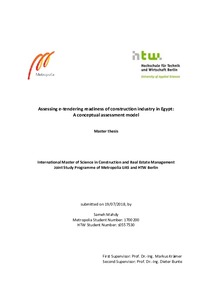Assessing e-tendering readiness of construction industry in Egypt : A conceptual assessment model
Mahdy, Sameh (2018)
Mahdy, Sameh
Metropolia Ammattikorkeakoulu
2018

Creative Commons Attribution-NonCommercial 3.0 Unported
Julkaisun pysyvä osoite on
https://urn.fi/URN:NBN:fi:amk-2018101215955
https://urn.fi/URN:NBN:fi:amk-2018101215955
Tiivistelmä
Realizing the importance and benefits of e-Commerce, many EC and EU directives have set a time frame and deadlines for the implementation e-Procurement within the EU Countries (EU, 2005; Bausà Peris, et al., 2013). Starting from 2018, it became mandatory for all federal project in Germany to use e-Tendering platform (Perosnal Communicaton, 2018). Construction industry is a major sector in economies (Keane & Caletka, 2008; Hermes, 2017), and may benefits from the adaptation and adoption of e-Procurement as the current procurement and tendering practices within the industry are bureaucratic, ineffective, non-transparent, costly (Khalil & Waly, 2015) and information and paper intensive (Weng Lou & Alshawi, 2009). Adoption of the e-procurement is said to help revolutionize the construction industry and bring it to the information age (McIntosh & Sloan, 2001).
Construction industry, however, has been slow in the uptake of technology. Characteristics of the industry, namely the fragmented nature, the pragmatism, the lack of leadership, the absence of standard in technology and business models, and resistance to change have denied the construction industry the benefits of e-Business (Rankin, et al., 2006). Evidently, there is a need to assess the readiness of any construction organization prior to adoption of ICT projects to avoid the consequence of sub-optimal implementation, or even the total failure and abandonment of the project (Salleh, et al., 2010). A failure that is mainly attributed to the soft issues (Salleh, et al., 2010; Weng Lou & Alshawi, 2009), and therefore, gauging readiness of people and technology before the implementation of the technology is deemed extremely important (Salleh, et al., 2010).
In Egypt, the effort of the government implementing to implement a e-Procurement starting in 2010 (OECD, 2016) had been facing challenges mounted by the same soft issues identified in researches (OECD, 2013). Therefore, this research aims to developing a conceptual assessment model based on similar models, the drivers and the barriers of the adoption of e-Procurement in the construction industry for the pre evaluation of the industry prior to the implementation of the technology project. Assessment model is developed for evaluation of Egyptian construction industry readiness for the uptake of future e-Procurement.
Following the development and validation of the assessment model, a methodology for applying the assessment model based on the EFQM process is proposed. Research shall also reflect on the possible measures to improve e-Readiness of construction organizations. Finally, the research is concluding with recommendations for future research.
Construction industry, however, has been slow in the uptake of technology. Characteristics of the industry, namely the fragmented nature, the pragmatism, the lack of leadership, the absence of standard in technology and business models, and resistance to change have denied the construction industry the benefits of e-Business (Rankin, et al., 2006). Evidently, there is a need to assess the readiness of any construction organization prior to adoption of ICT projects to avoid the consequence of sub-optimal implementation, or even the total failure and abandonment of the project (Salleh, et al., 2010). A failure that is mainly attributed to the soft issues (Salleh, et al., 2010; Weng Lou & Alshawi, 2009), and therefore, gauging readiness of people and technology before the implementation of the technology is deemed extremely important (Salleh, et al., 2010).
In Egypt, the effort of the government implementing to implement a e-Procurement starting in 2010 (OECD, 2016) had been facing challenges mounted by the same soft issues identified in researches (OECD, 2013). Therefore, this research aims to developing a conceptual assessment model based on similar models, the drivers and the barriers of the adoption of e-Procurement in the construction industry for the pre evaluation of the industry prior to the implementation of the technology project. Assessment model is developed for evaluation of Egyptian construction industry readiness for the uptake of future e-Procurement.
Following the development and validation of the assessment model, a methodology for applying the assessment model based on the EFQM process is proposed. Research shall also reflect on the possible measures to improve e-Readiness of construction organizations. Finally, the research is concluding with recommendations for future research.
